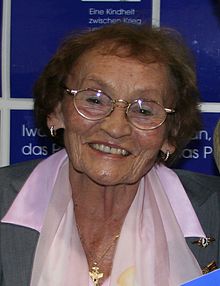Hildegard Rauschenbach
Hildegard Rauschenbach b. Mischke (born March 15, 1926 in Dickschen , Pillkallen district , East Prussia ; † February 7, 2010 in Berlin ) was a German writer .
Life
Hildegard Mischke grew up in East Prussia. Her two brothers died in World War II. In 1945 she was one of 250,000 women and girls who were arrested by the Red Army and deported to Gulags from East Prussia and Pomerania . She had to do three and a half years of forced labor in the 6437 forced labor camp in Schadrinsk before she could return to Germany. She lived in Berlin since 1950. There she married Heinz Rauschenbach in the same year , with whom she had a son. She wrote eight books, many short stories and essays, articles for the print media, 100 poems and 50 songs, some in Low Prussian . Songs she sang from East Prussia are preserved on records .
On the 2001 Memorial Day , she gave a commemorative speech in the Reichstag building for people who died in the wars. In the same year she initiated the memorial for the German women and girls kidnapped in World War II , which the Volksbund Deutsche Kriegsgräberfürsorge erected at the Lilienthalstrasse cemetery (Berlin) . She received a Federal Order of Merit for her great contribution to understanding between the Russian and German people . In June 2010 , N. Dejnova published an obituary in the Schadrinsk Gans , a Russian literary newspaper, entitled “Forgive yes, never forget” .
“It was my inner compulsion to write everything down. I didn't exaggerate or gloss over anything. I am not a writer and I have told everything in simple words that everyone knows. I have also not carried out any research and hope that my book does not contain any tendency statements. My deep gratitude goes to those Russian people who were able to put themselves in our position and who helped us even though they only had the bare essentials for life. This book is intended to show people, including my son, to whom I dedicate it, that regardless of all the difficulties one may encounter in life, one can forgive and at the same time remain an optimist. "
Honors
- Federal Cross of Merit on Ribbon (2002)
- Gold Medal of Honor of the East Prussian Landsmannschaft (2002)
- Culture Prize of the Landsmannschaft East Prussia (2008)
Works
- At home in Pillkallen. Village stories experienced in East Prussia . Rautenberg, Leer 2003. ISBN 978-3800330621 .
- Marjellchen becomes a Berliner. Coming home from Siberia and starting over . Rautenberg, Leer 1990. ISBN 978-3800330614 .
- From Pillkallen to Schadrinsk. My time in 'Camp 6437' and seeing you again after 43 years . Rautenberg, Leer 2001. ISBN 978-3792105238 .
- Camp 6437. I was deported to Siberia . Rautenberg, Leer 1994. ISBN 978-3792102992 .
- Lumpy and funny. East Prussian originals in a Pungel . Rautenberg, Leer 2003. ISBN 978-3800330652 .
- Marjellchen's tricky relationship. From old East Prussia . Westkreuz-Verlag, Bad Münstereifel 2001. ISBN 978-3929592610 .
- Forgive yes, never forget - then dragged off in the Ural region, today on the path of reconciliation . Westkreuz-Verlag, Bad Münstereifel 2001. ISBN 978-3929592160 .
- Marjellchen is plodding again. Stories, recipes, proverbs . Rautenberg, Leer 2005. ISBN 978-3800331017 .
Web links
- Literature by and about Hildegard Rauschenbach in the catalog of the German National Library
- WorldCat
- Married couple Rauschenbach, Abramowo – Dickschen / Lindbach (ostpreussen.net)
- Dickschen (GenWiki)
Individual evidence
- ↑ a b District Community Schloßberg
- ↑ Der Tagesspiegel : Hildegard Rauschenbach (born 1926) - “We lost the war, we had to pay the tribute” from May 21, 2010
- ^ PAZ 6/10 of February 13, 2010
| personal data | |
|---|---|
| SURNAME | Rauschenbach, Hildegard |
| ALTERNATIVE NAMES | Mischke, Hildegard (maiden name) |
| BRIEF DESCRIPTION | German writer |
| DATE OF BIRTH | March 15, 1926 |
| PLACE OF BIRTH | Dickschen , Pillkallen district , East Prussia |
| DATE OF DEATH | February 7, 2010 |
| Place of death | Berlin |
